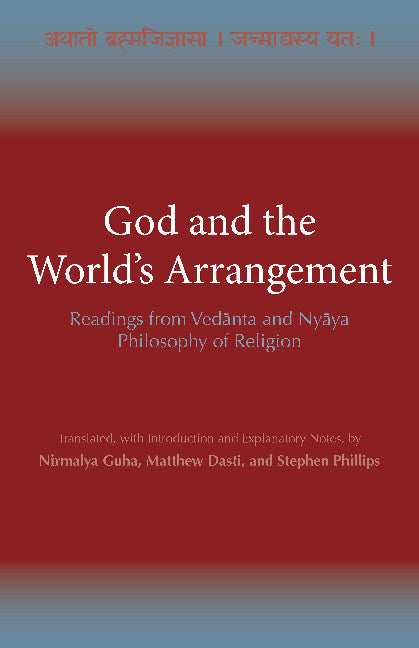The work of three present-day Sankritist-philosophers, God and the World's Arrangement allows readers to engage directly with writings of the classical Indian philosophers Śaṅkara and Vācaspati, as well as some of their most acute critics, on the question of whether the existence of a creator God can be known by reason alone. Carefully selected and annotated with the needs of students foremost in mind, these new translations will be of interest to anyone wishing to see up close a newly set gem of our philosophical inheritance from global antiquity.
Matthew Dasti is Associate Professor of Philosophy, Bridgewater State University.
Stephen Phillips is Professor of Philosophy and Asian Studies, The University of Texas at Austin.
"Students and scholars should welcome this outstanding translation and commentary. Offering core passages of Nyāya and Vedānta in accessible English will expand the horizon of contemporary philosophy of religion and make more evident the often-overlooked elements of natural theology in non-Western philosophy." Charles Taliaferro, Overby Distinguished Chair, St. Olaf College
"Philosophers are waking up to the fact that the philosophy of religion includes more than Christian theology. Guha, Dasti, and Phillips have given us an invaluable resource for globalizing our teaching of the philosophy of religion, and for teaching Indian philosophy. But they have done more than that. This beautiful volume provides a model for the translation of Indian philosophical texts, and for presenting them to a Western audience. Sūtras and commentaries are translated into clear, accessible contemporary philosophical English with no clutter, and without any sacrifice of philological precision. The essays that contextualize the texts are both learned and readable, and substantially enhance the texts themselves, whether the reader is a professional philosopher or a student." Jay L. Garfield, Doris Silbert Professor in the Humanities and Professor of Philosophy, Logic and Buddhist Studies, Smith College
"Building on a long tradition of textual study, an increasing number of universities today demonstrate interest in Asian perspectives on philosophy, religion, theology, politics, and other disciplineseven for general education. This book offers a welcome and a needed addition to teachers and students that want to learn about Asia through a careful reading of primary source material. It covers some broad topics recognizable in the philosophy of religion, and it gives precision through the presentation of specific texts from the Indian tradition. This book offers a clear picture into the scholastic and commentarial writing from two monuments in the Indian tradition, Shakara and Vacaspati. The discussion around the primary source material offers helpful contextualization, and the primary readings introduce students to a complex and a detailed world of philosophy, theology, and the unique modes of commentarial writing in Shankara, Vacaspati, and related theologians, philosophers, and root texts of their time." Jonathan Edelmann, Department of Religion, University of Florida

